- Home
- Ian Mcewan
The Cockroach
The Cockroach Read online
Ian McEwan
THE COCKROACH
Ian McEwan is the bestselling author of eighteen books, including the novels Machines Like Me; Nutshell; The Children Act; Sweet Tooth; Solar, winner of the Bollinger Everyman Wodehouse Prize; On Chesil Beach; Saturday; Atonement, winner of the National Book Critics Circle Award and the W. H. Smith Literary Award; The Comfort of Strangers and Black Dogs, both shortlisted for the Booker Prize; Amsterdam, winner of the Booker Prize; and The Child in Time, winner of the Whitbread Award; as well as the story collections First Love, Last Rites, winner of the Somerset Maugham Award, and In Between the Sheets.
www.ianmcewan.com
ALSO BY IAN MCEWAN
First Love, Last Rites
In Between the Sheets
The Cement Garden
The Comfort of Strangers
The Child in Time
The Innocent
Black Dogs
The Daydreamer
Enduring Love
Amsterdam
Atonement
Saturday
On Chesil Beach
Solar
Sweet Tooth
The Children Act
Nutshell
Machines Like Me
AN ANCHOR BOOKS ORIGINAL, OCTOBER 2019
Copyright © 2019 by Ian McEwan
All rights reserved. Published in the United States by Anchor Books, a division of Penguin Random House LLC, New York. Originally published in paperback in Great Britain by Jonathan Cape, an imprint of Vintage Publishing, a division of Penguin Random House Ltd., London, in 2019.
Anchor Books and colophon are registered trademarks of Penguin Random House LLC.
This is a work of fiction. Names, characters, places, and incidents either are the product of the author’s imagination or are used fictitiously. Any resemblance to actual persons, living or dead, events, or locales is entirely coincidental.
The quotation on this page is from the song ‘Walking Back to Happiness’, with lyrics by Michael Hawker and John Francis Schroeder.
The LCCN is on file at the Library of Congress.
Anchor Books Trade Paperback ISBN 9780593082423
Ebook ISBN 9780593082430
Author photograph © Jeremy Sutton-Hibbert
Cover design by Suzanne Dean
Cover images: cockroach © Library Book Collection/Alamy; Union Jack © Milan M/Shutterstock
www.anchorbooks.com
v5.4
a
Contents
Cover
About the Author
Also by Ian McEwan
Title Page
Copyright
Dedication
Disclaimer
Chapter One
Chapter Two
Chapter Three
Chapter Four
To Timothy Garton Ash
This novella is a work of fiction. Names and characters are the product of the author’s imagination and any resemblance to actual cockroaches, living or dead, is entirely coincidental.
ONE
That morning, Jim Sams, clever but by no means profound, woke from uneasy dreams to find himself transformed into a gigantic creature. For a good while he remained on his back (not his favourite posture) and regarded his distant feet, his paucity of limbs, with consternation. A mere four, of course, and quite unmoveable. His own little brown legs, for which he was already feeling some nostalgia, would have been waving merrily in the air, however hopelessly. He lay still, determined not to panic. An organ, a slab of slippery meat, lay squat and wet in his mouth – revolting, especially when it moved of its own accord to explore the vast cavern of his mouth and, he noted with muted alarm, slide across an immensity of teeth. He stared along the length of his body. His colouring, from shoulders to ankles, was a pale blue, with darker blue piping around his neck and wrists, and white buttons in a vertical line right down his unsegmented thorax. The light breeze that blew intermittently across it, bearing a not unattractive odour of decomposing food and grain alcohol, he accepted as his breath. His vision was unhelpfully narrowed – oh for a compound eye – and everything he saw was oppressively colourful. He was beginning to understand that by a grotesque reversal his vulnerable flesh now lay outside his skeleton, which was therefore wholly invisible to him. What a comfort it would have been to catch a glimpse of that homely nacreous brown.
All this was worrying enough, but as he came more fully awake he remembered that he was on an important, solitary mission, though for the moment he could not recall what it was. I’m going to be late, he thought, as he attempted to lift from the pillow a head that must have weighed as much as five kilos. This is so unfair, he told himself. I don’t deserve this. His fragmentary dreams had been deep and wild, haunted by raucous, echoing voices in constant dissent. Only now, as this head slumped back, did he begin to see through to the far side of sleep and bring to mind a mosaic of memories, impressions and intentions that scattered as he tried to hold them down.
Yes, he had left the pleasantly decaying Palace of Westminster without even a farewell. That was how it had to be. Secrecy was all. He had known that without being told. But when exactly had he set out? Certainly it was after dark. Last night? The night before? He must have left by the underground car park. He would have passed the polished boots of the policeman at the entrance. Now he remembered. Keeping to the gutter, he had hurried along until he had reached the edge of the terrifying crossing in Parliament Square. In front of a line of idling vehicles impatient to pestle him into the tarmac, he made a dash for the gutter on the far side. After which, it seemed a week passed before he crossed another terrifying road to reach the correct side of Whitehall. Then what? He had sprinted, surely, for many yards and then stopped. Why? It was coming back to him now. Breathing heavily through every tube in his body, he had rested near a wholesome drain to snack on a discarded slice of pizza. He couldn’t eat it all, but he did his best. By good luck it was a margherita. His second favourite. No olives. Not on that portion.
His unmanageable head, he discovered, could rotate through 180 degrees with little effort. He turned it now to one side. It was a small attic bedroom, unpleasantly lit by the morning sun, for the curtains had not been drawn. There was a telephone at his bedside, no, two telephones. His constricted gaze travelled across the carpet to settle on the skirting board and the narrow gap along its lower edge. I might have squeezed under there out of the morning light, he thought sadly. I could have been happy. Across the room there was a sofa and by it, on a low table, a cut-glass tumbler and an empty bottle of scotch. Laid out over an armchair was a suit and a laundered, folded shirt. On a larger table near the window were two box files, one sitting on top of the other, both coloured red.
He was getting the hang of moving his eyes, now that he understood the way they smoothly swivelled together without his help. Rather than letting his tongue hang out beyond his lips, where it dripped from time to time onto his chest, he found it was more comfortably housed within the oozing confines of his mouth. Horrible. But he was acquiring the knack of steering his new form. He was a quick learner. What troubled him was the need to set about his business. There were important decisions to be taken. Suddenly, a movement on the floor caught his attention. It was a little creature, in his own previous form, no doubt the displaced owner of the body he now inhabited. He watched with a degree of protective interest as the tiny thing struggled over the strands of pile carpet, towards the door. There it hesitated, its twin antennae waving uncertainly with all of a beginner’s ineptitude. Finally, it gathered its courage and stumbled under the door to begin a difficu
lt, perilous descent. It was a long way back to the palace, and there would be much danger along the way. But if it made it without being squashed underfoot, it would find, behind the palace panelling or below the floorboards, safety and solace among millions of its siblings. He wished it well. But now he must attend to his own concerns.
And yet Jim did not stir. Nothing made sense, all movement was pointless until he could piece together the journey, the events, that had led him to an unfamiliar bedroom. After that chance meal he had scuttled along, barely conscious of the bustle above him, minding his own business as he hugged the shadows of the gutter, though for how long and how far was beyond recall. What he knew for certain was that he reached at last an obstacle that towered over him, a small mountain of dung, still warm and faintly steaming. Any other time, he would have rejoiced. He regarded himself as something of a connoisseur. He knew how to live well. This particular consignment he could instantly place. Who could mistake that nutty aroma, with hints of petroleum, banana skin and saddle soap. The Horse Guards! But what a mistake, to have eaten between meals. The margherita had left him with no appetite for excrement, however fresh or distinguished, nor any inclination, given his gathering exhaustion, to clamber all the way over it. He crouched in the mountain’s shadow, on the springy ground of its foothills, and considered his options. After a moment’s reflection, it was clear what he must do. He set about scaling the vertical granite wall of the kerb in order to circumvent the heap and descend on its far side.
Reclining now in the attic bedroom, he decided that this was the point at which he had parted company with his own free will, or the illusion of it, and had come under the influence of a greater, guiding force. Mounting the pavement, as he did, he submitted to the collective spirit. He was a tiny element in a scheme of a magnitude that no single individual could comprehend.
He heaved himself onto the top of the kerb, noting that the droppings extended a third of the way across the pavement. Then, out of nowhere, there came down upon him a sudden storm, the thunder of ten thousand feet, and chants and bells, whistles and trumpets. Yet another rowdy demonstration. So late in the evening. Loutish people making trouble when they should have been at home. Nowadays, these protests were staged almost every week. Disrupting vital services, preventing ordinary decent types from going about their lawful business. He froze on the kerb, expecting to be squashed at any moment. The soles of shoes fifteen times his own length slammed the ground inches from where he cowered and made his antennae and the pavement tremble. How fortunate for him that at one point he chose to look up, entirely in the spirit of fatalism. He was prepared to die. But that was when he saw an opportunity – a gap in the procession. The next wave of protesters was fifty yards away. He saw their banners streaming, their flags bearing down, yellow stars on a blue ground. Union Jacks too. He had never scuttled so fast in his life. Breathing hard through all the trachea on his body segments, he gained the other side by a heavy iron gate seconds before they were on him again with thunderclaps of hideous tramping, and now catcalls and savage drumbeats. Seized by mortal fear and indignation, an inconvenient mix, he darted off the pavement and, to save his life, squeezed under the gate into the sanctuary and relative tranquillity of a side street where he instantly recognised the heel of a standard issue policeman’s boot. Reassuring, as ever.
Then what? He proceeded along the empty pavement, past a row of exclusive residences. Here he was surely fulfilling the plan. The collective pheromonal unconscious of his kind bestowed on him an instinctive understanding of his direction of travel. After half an hour of uneventful progress, he paused, as he was meant to do. On the far side of the street was a group of a hundred or so photographers and reporters. On his side, he was level with and close by a door, outside which stood yet another policeman. And just then, that door swung open and a woman in high heels stepped out, almost spearing him right through his ninth and tenth abdominal segments. The door remained open. Perhaps a visitor was arriving. In those few seconds Jim looked into a welcoming, softly lit hallway, with skirting boards somewhat scuffed – always a good sign. On a sudden impulse that he now knew was not his own, he ran in.
He was doing well, given his unusual circumstances, lying on this unfamiliar bed, to recall such details. It was good to know that his brain, his mind, was much as it had always been. He remained, after all, his essential self. It was the surprising presence of a cat that had caused him to run, not in the direction of the skirting boards, but towards the stairs. He climbed three and looked back. The cat, a brown and white tabby, had not seen him, but Jim considered it dangerous to descend. So began his long climb. On the first floor there were too many people walking along the landing, in and out of rooms. More prospect of being trodden to death. An hour later, when he reached the second floor, the carpets were being vigorously vacuumed. He knew of many souls who had been lost that way, sucked into dusty oblivion. No choice but to keep on climbing until— but now, suddenly, here in the attic, all his thoughts were obliterated by the harsh ringing of one of the bedside telephones. Even though he found that he could at last move one of his limbs, an arm, he did not stir. He couldn’t trust his voice. And even if he could, what would he say? I’m not who you think I am? After four rings the phone went silent.
He lay back and allowed his frantic heart to settle. He practised moving his legs. At last, they stirred. But barely an inch. He tried again with an arm, and raised it until it towered far above his head. So, back to the story. He had heaved himself up the last step to arrive breathless on the top landing. He squeezed under the nearest door into a small apartment. Usually, he would have made straight for the kitchen but instead he climbed a bedpost and, utterly depleted, crept under a pillow. He must have slept deeply for— but now, dammit, there came a tapping sound and before he could respond, the door to the bedroom was opening. A young woman in a beige trouser suit stood on the threshold and gave a brisk nod before entering.
‘I tried phoning but I thought I’d better come up. Prime Minister, it’s almost seven thirty.’
He could think of no response.
The woman, clearly an aide of some kind, came into the room and picked up the empty bottle. Her manner was rather too familiar.
‘Quite an evening, I see.’
It would not have done to remain silent for long. From his bed he aimed for an inarticulate sound, somewhere between a groan and a croak. Not bad. Higher pitched than he would have wanted, with a hint of a chirrup, but plausible enough.
The aide was gesturing towards the larger table, at the red boxes. ‘I don’t suppose you had a chance to, uh…’
He played it safe by making the same sound again, this time on a lower note.
‘Perhaps after breakfast you could take a…I should remind you. It’s Wednesday. Cabinet at nine. Priorities for government and PMQs at noon.’
Prime Minister’s Questions. How many of those he had crouched through, listening enthralled from behind the rotten wainscoting in the company of a few thousand select acquaintances? How familiar he was with the opposition leader’s shouted questions, the brilliant non sequitur replies, the festive jeers and clever imitations of sheep. It would be a dream come true, to be primo uomo in the weekly operetta. But was he adequately prepared? No less than anyone else, surely. Not after a quick glance at the papers. Like many of his kind, he rather fancied himself at the despatch box. He would be fast on his feet, even though he only had two.
In the space where once he sported a fine mandible, the unwholesome slab of dense tissue stirred and his first human word rolled out.
‘Righto.’
‘I’ll have your coffee ready downstairs.’
He had often sipped coffee in the dead of night on the tea room floor. It tended to keep him awake in the day, but he enjoyed the taste and preferred it milky, with four sugars. He assumed this was generally known by his staff.
As soon as the aide had left the room, he pushe
d away the covers and managed at last to swing his tuberous legs onto the carpet. He stood at last at a vertiginous height, swaying slightly, with his soft, pale hands pressed to his forehead, and groaning again. Minutes later, making his unsteady way towards the bathroom, those same hands began nimbly to remove his pyjamas. He stepped out of them to stand on pleasantly heated tiles. It rather amused him, passing water thunderously into a specially prepared ceramic bowl, and his spirits lifted. But when he turned to confront the mirror over the handbasin, they sank again. The bristling oval disk of a face, wobbling on a thick pink stalk of neck, repelled him. The pinprick eyes shocked him. The inflated rim of darker flesh that framed an array of off-white teeth disgusted him. But I’m here for a proud cause and I’ll put up with anything, he reassured himself as he watched his hands turn the taps and reach for his shaving brush and soap.
Five minutes later he felt nauseated as he paused, still swaying, before the prospect of putting on the clothes laid out for him. His own sort took great pride in their beautiful, gleaming bodies and would never have thought to cover them up. White underpants, black socks, a blue and white striped shirt, dark suit, black shoes. He observed with detachment the automatic speed with which his hands tied his laces, and then, back at the bathroom mirror, his tie. As he combed his gingery brown hair, he noticed with sudden homesickness that it was the same colour as his good old shell. At least something has survived of my looks, was his melancholy thought as, finally, he stood at the top of the stairs.
He began a dizzying descent, trusting his legs to carry him down safely as he had his hands to shave and dress him. He kept a firm grip on the bannisters, smothering a groan at each step. As he crossed the landings, where there were hairpin turns, he clung on with both hands. He could have passed for a man with a hangover. But what had taken an hour to climb up took only seven minutes to climb down. Waiting for him in the hallway at the foot of the stairs was a group of very young men and women, each holding a folder. Respectfully they murmured, ‘Good morning, Prime Minister,’ in a soft, uneven chorus. None of them dared look at him directly while they waited for him to speak.

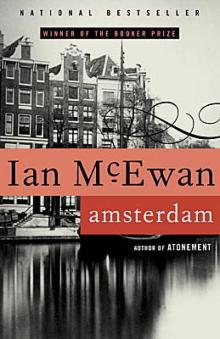 Amsterdam
Amsterdam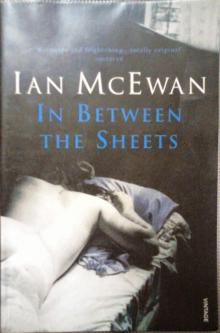 In Between the Sheets
In Between the Sheets Atonement
Atonement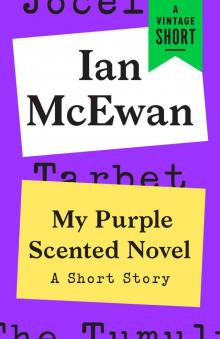 My Purple Scented Novel
My Purple Scented Novel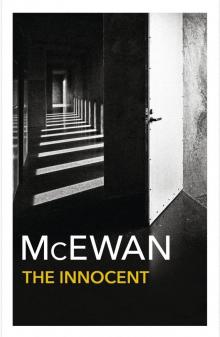 The Innocent
The Innocent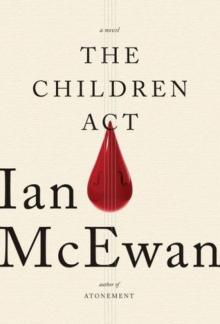 The Children Act
The Children Act Enduring Love
Enduring Love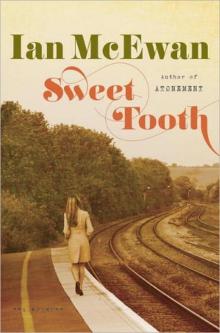 Sweet Tooth
Sweet Tooth On Chesil Beach
On Chesil Beach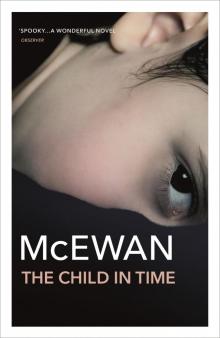 The Child in Time
The Child in Time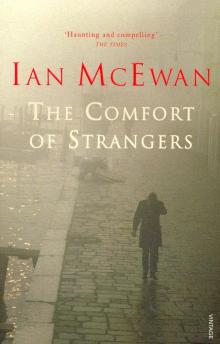 The Comfort of Strangers
The Comfort of Strangers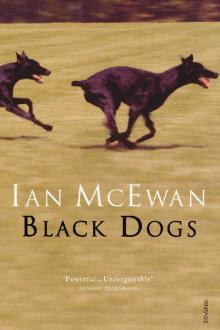 Black Dogs
Black Dogs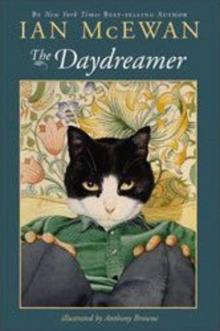 The Daydreamer
The Daydreamer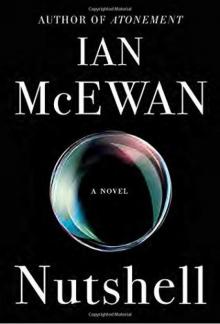 Nutshell
Nutshell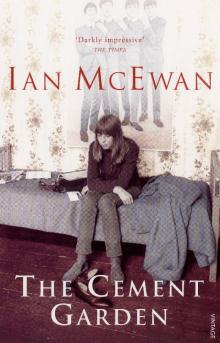 The Cement Garden
The Cement Garden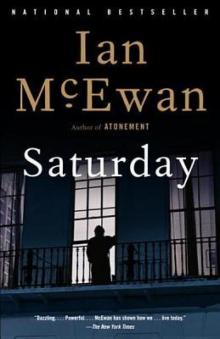 Saturday
Saturday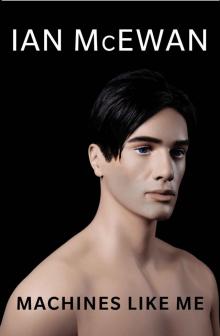 Machines Like Me
Machines Like Me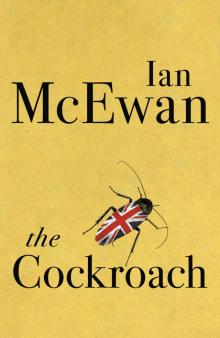 The Cockroach
The Cockroach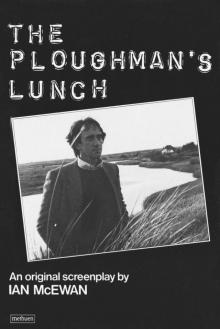 The Ploughman’s Lunch
The Ploughman’s Lunch